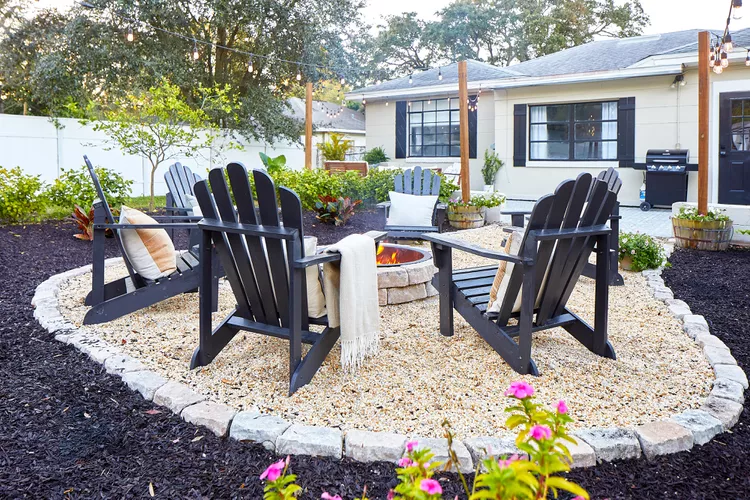Should You Use Shredded Rubber Mulch in Your Garden?

When searching for the perfect mulch, gardeners have tried out many materials over the years with mixed results. Bark chips, pebbles, lava rock, cocoa, coir, and even cardboard have promised long-lasting benefits with few downsides. But like any natural product, these types of mulch eventually decompose, fade, or sink into the soil.
When rubber mulch (made from recycled rubber) came onto the market, the promise was an eco-friendly product that would be everlasting, cheap, and stay put without the need to re-apply it over time. However, as with most products, rubber mulch is a mixed bag of pros and cons. Let's dive a bit deeper into rubber mulch and find out whether this product lives up to the hype.
What Is Shredded Rubber Mulch?
Rubber mulch is typically sourced from discarded shredded tires and used in a variety of applications, including roadways, playgrounds, and all-weather running tracks. Gardeners can obtain rubber mulch in four basic forms: crumbs, shreds, nuggets, and sheets. In most applications, rubber mulch tends to be more expensive than the traditional mulches it replaces, but it lasts far longer and can save money over many years.
The Benefits of Rubber Mulch
- Long life span. Unlike organic mulches, shredded rubber does not decompose or break down over time and essentially lasts a lifetime in the garden. Barring flooding, heavy erosion, or other catastrophic events, rubber mulch is unlikely to move at all. Provided leaves and soil are removed annually, it remains unscathed.
- Prevents weeds. When thickly applied, rubber mulch acts as an effective weed barrier, and weeds find it especially difficult to take root as the mulch lacks pores and does not retain any moisture. Weed seeds begin to grow but quickly die off for lack of moisture.
- Conserves soil moisture. Rubber acts as an excellent moisture barrier when applied in a thick layer across the surface of the soil. When it rains or snows, moisture can penetrate the rubber to reach the soil, where the mulch prevents it from evaporating quickly.
- Easy to transport. Unlike rocks and pebbles, rubber mulch is dense but not heavy and can be moved in large quantities.
- Long-lasting colors. Over the years, variously colored bark mulches have come and gone in popularity. However, these colors tend to fade over the course of a couple of seasons, depending on their exposure to water and sun. Rubber mulches are also available in a variety of colors, but unlike organic mulches, rubber mulches tend to hold their color for many years, ensuring a long-lasting look and little variability across the yard, regardless of exposure to the elements.
- Repurposed waste product. Rubber mulch is a recycled material (old tires), and is a practical means of creating something of value from a waste stream. Rather than ending up in landfills or dumped in large bodies of water (as was common in the not-so-distant past), the tires are recycled into new products that can be used for many years without needing replacement.
Unlike bark and shredded wood mulches, rubber mulch doesn't splinter, making it safe for bare feet.
The Downsides of Rubber Mulch
While the benefits of using recycled everlasting rubber as mulch sound great, there are plenty of reasons why you may not want to use rubber mulch in your landscaping.
- Does not enhance soil. Rubber mulch does not break down over time through decomposition and is essentially inert, but healthy gardens are dynamic and ever-changing; their soils teem with life and flow with nutrients from organic matter. Organic mulches provide a constant supply of humus and food for beneficial bacteria and fungi while absorbing and holding moisture and tempering localized humidity and temperatures. So while organic mulches need to be reapplied from time to time, their decomposition benefits the soil and—by extension—the plants in your garden.
- Can get very hot. Another less-than-appealing aspect of rubber mulch is that it absorbs and holds heat easily. That can lead to damaged plants and burns on animal paws; it dissuades wildlife from entering the yard. The mulch even can combust under some circumstances. Rubber is difficult to extinguish once it combusts and is extremely toxic, releasing pollutants into the atmosphere and baking them into the soil below.
- Difficult to remove. Because rubber does not decompose, if and when you decide to remove it from the yard, you need to pick up every last piece you initially brought in and find a way to dispose of it in bulk. Like glitter in the house, once it’s there, chances are you’ll be finding it long after you’ve decided to get rid of it.
The Verdict
Rubber mulch can work very well in some locations and for some uses such as for a path where nothing is planted. But in other places and situations, rubber mulch can be an absolute nightmare. Definitely think through all the pros and cons before deciding whether to add the product to your landscape.